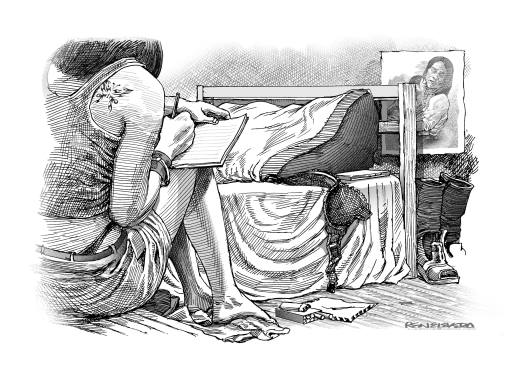In one human trafficking case, the prosecution presented the notebooks kept by the girls who worked as commercial sex workers. The entries there included a list of daily customers classified according to nationality, as well as cash advances made, items bought on credit from the brothel store, and monthly periods.
Toward the end pages, one notebook carried a letter addressed to God, really a prayer, asking for help in saving enough to repair the girl’s house, a simple shelter in the country, where the girl’s family lived. Whenever she found time, she probably headed for that humble home, to which in the end, no matter the fortune that awaited her, she would return.
Many girls like her find themselves in brothels because of the need to live.
They probably started well, going with a friend or acquaintance, who might have promised them a job in the city, and discovered the ruse too late, when they could not do anything about it.
I thought of this when I reflected on the letter or prayer, and initially the question came to me how a girl who sold herself to strangers would even think of writing to God, and in terms such as a child would address a father.
Subconsciously I had condemned the girl and exhibited the bias that society has against her like – whom respectable people give disparaging names: woman of the streets, lady of the night, scarlet woman, strumpet, harlot, woman of ill repute, lady of pleasure.
When still a boy, at an earlier and a supposedly more innocent time, I witnessed that bias in a father who instructed his daughter who had received a fountain pen as gift from their neighbor who reportedly worked as a prostitute in Manila to sterilize the Waterman with alcohol.
And yet Jesus associated himself with prostitutes. Not only that, as Matthew writes in his Gospel, Jesus told the chief priests and elders of the people that the prostitutes, as well as tax collectors, would make their way into the kingdom of God before them.
“I tell you solemnly, tax collectors and prostitutes are making their way into the kingdom of God before you. For John came to you, a pattern of true righteousness, but you did not believe him, and yet the tax collectors and prostitutes did. Even after seeing that, you refused to think better of it and believe in him.”
The prosecution did not present the girls in court – they refused to testify against their bosses, the managers of the bordello.
Already invisible to the eyes of society, they just disappeared. Perhaps they did not want to further complicate their lives, and facing their employers in court would broach a cask of emotions which they might not have control of, or, more likely, they had found a way of escaping from a vicious circle – in which case the girl who owned the notebook would have gone back to the hut that she called her home, which she had called on God to mend and preserve.
I found the prostitute’s letter as genuine a prayer as one could make.
It simply asked for the funds, perhaps to buy thatch for the roof or bamboo slats for the floor, or to replace the small house with a better, though likely enough a still modest dwelling.
When one addresses God from a position of smallness, one’s words cannot fail to win God’s ears. And in her state, the girl had lost the opportunity for pride.
To my mind, Jesus saw this as the advantage that the prostitutes had, and tax collectors – sinners conscious of their sinfulness and open to God’s mercy. I feel that the girl asked God to repair not just her house. Because if humility comes, can salvation be far behind?
Disclaimer: The comments uploaded on this site do not necessarily represent or reflect the views of management and owner of Cebudailynews. We reserve the right to exclude comments that we deem to be inconsistent with our editorial standards.

